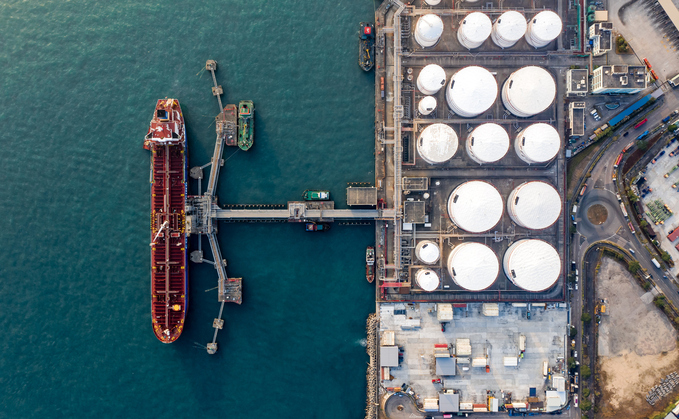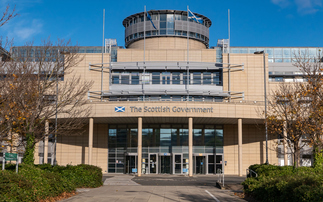
Credit: iStock
The government’s proposed package of energy market reforms are wide-ranging and broadly sensible, if worryingly incomplete - so why all the focus on controversial new gas power plants?
Find someone who looks at you the way Rishi Sunak and Claire Coutinho look at new gas-fired power plants.
That appears to be the main message the government wants taken from today's unveiling of the biggest set of energy market reforms in over a decade. The second consultation on the Review of Electricity Market Arrangements (REMA) may contain potentially transformational proposals to boost renewables investment, curb energy bills, and reshape the economic and industrial geography of the UK, but the near exclusive focus of government's press release, this morning's ministerial media round, and Coutinho's speech at Chatham House is on plans that may or may not result in a handful of new gas fired power plants.
The disconnect between the substance of what the government is actually announcing, and the accompanying media spin is as disorienting as it is bizarre.
The message the government wants to highlight is that it will, in Sunak's words, "not gamble with our energy security" and "will make the tough decisions so that no matter what scenario we face, we can always power Britain from Britain". For Coutinho, that means "gas backing up renewables" to avoid "the genuine prospect of blackouts".
"There are no easy solutions in energy, only trade-offs," she added. "If countries are forced to choose between clean energy and keeping citizens safe and warm, believe me they'll choose to keep the lights on. We will not let ourselves be put in that position. And so, as we continue to move towards clean energy, we must be realistic."
But none of this is as controversial as the government seems to think. Expecting credit for keeping the lights on is akin to an Education Secretary wanting thanks for doing a "great job" stopping school ceilings falling on students. No one wants blackouts. Decarbonising the grid while maintaining energy security and affordability is literally the job.
It was notable that Shadow Energy Security and Net Zero Secretary Ed Miliband was this morning quick to declare that "of course we need to replace retiring gas-fired stations as part of a decarbonised power system, which will include carbon capture and hydrogen playing a limited back up role in the system". The government may want to create electoral dividing lines here, but they are not as pronounced as Number 10 seems to think.
In this context, the government's proposals to reform the Capacity Market to deliver reliable gas power capacity are broadly sensible - as far as they go. It makes sense to clarify how 'net zero ready' gas power plants can transition to either install carbon capture and storage (CCS) technology or switch to run on clean hydrogen. It is also hugely welcome to see the government talking about improved support for lower carbon forms of back up capacity. And given the importance of keeping the lights on and the considerable uncertainties that characterise the net zero transition it is probably wise to introduce a bit more flexibility into how and when gas plants can be used.
But as energy analyst Tom Haddon noted "for the culture war warriors out there" on X this morning, "there is literally nothing new about incentivising new/refurbished gas plant. [It's] been the core aim of the capacity market for many years. This is nothing new or to get upset about".
What is worth getting upset about is the way these proposed reforms fail to fully integrate with a wider decarbonisation strategy that remains badly underpowered and characterised by myriad inconsistencies and contradictions.
The most important part of the REMA package with regards to the putative new gas power plants the government wants to see are the vague commitments to continue to advance long-awaited policies on CCS and hydrogen. "To ensure clear decarbonisation pathways for our remaining unabated gas generation, greater hydrogen and CO2 capacity would need to be available in future," the consultation states. "This extensive build-out of low carbon flexible capacity and supporting infrastructure to secure electricity supply through to 2035 and beyond will need sustained investment through public policy frameworks to leverage private finance." Well, yes. Everyone knows this, but where are these policy frameworks?
Ever since the last wave of electricity market reforms over a decade ago it has been clear the UK's energy decarbonisation goals and wider net zero targets will be delivered through a renewables-dominated smart grid, complemented by nuclear and CCS and/or hydrogen power plants. In the ensuing decade the renewables rollout has accelerated, albeit not fast enough, and a nuclear, CCS, and hydrogen project pipeline has belatedly taken shape. But despite the government recognising this pipeline is essential to the UK's energy security and climate goals, Ministers are still yet to make the policy decisions that would enable projects to actually advance.
As such, the government is this morning in the position of urging gas companies to deliver net zero ready gas plants, but without explaining the crucial context in which those plants would later be required to eradicate their emissions.
The same inconsistency is evident in the potentially transformational proposals to introduce a locational pricing regime for the wholesale market. These reforms should help to optimise the grid, curb energy costs, and accelerate renewables development by minimising the need for accompanying transmission and energy storage projects. But as many within the industry pointed out yesterday, incentivising the development of renewables closer to the biggest sources of energy demand only works if the planning system allows for those new projects to get built. Currently, this is not the case. Without significant planning reforms these proposals risk falling flat, or worse still could undermine investment in urgently needed renewables projects.
"Changes to electricity markets will need to work alongside a range of wider policy actions underway to accelerate the pace of network build, reduce connection timescales and take a more strategic and co-ordinated approach to spatial planning for energy infrastructure," the consultation states. Again, yes, but the government is simply throwing a spotlight on a problem it has spent over a decade failing to fix.
If Ministers were really worried about energy security they would have properly lifted the 'de facto' ban on new onshore wind farms, provided sufficient funding for the next offshore wind auction, delivered a final investment decision for Sizewell C, and launched a credible national energy efficiency strategy. They would also ask themselves if energy security is really best served by locking in UK reliance on inherently volatile gas imports and domestic gas from a declining North Sea basin, and whether alternative forms of back up power could prove more reliable. If they still concluded they really wanted new gas power plants to play a role in the net zero transition, they would stop stalling and set out how and when these plants can expect to deploy CCS or switch to hydrogen.
Instead, the fixation with delivering more gas investment come what may is serving to distract from the urgent policy choices that are required to deliver a realistic and energy secure net zero strategy. A strategy that is urgently needed if the UK is to stand any chance of catalysing the investment required to meet the emissions targets it is currently on track to miss. If the Prime Minister wants credit for taking "the tough decisions so that no matter what scenario we face, we can always power Britain from Britain" he should try making some.
Keep up to date with all the latest green business news by signing up to the free Daily and Weekly BusinessGreen Newsletters.










